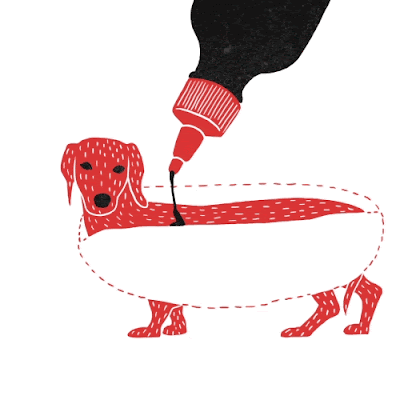每周一文:貼標籤不能解決仇恨與暴力,閱讀好文這篇別漏掉! Less labeling and more love for that certain someone around us.
 |
| illustration by Harriet Lee-Merrion |
Less labeling,
more love for the potential Cheng Cheihs
When you stab someone with a knife, it creates two gashes傷口: first by entering the victim
and ultimately via the scar left in their loved ones' hearts. It is inevitable
that grief gives way to會讓人決定去 a burning desire to seek vengeance燃燒著復仇的渴望; an urge迫切的要求 that would consume吞噬 even the most logical of people.
We who are not directly affected
will then label an attacker as a
murderer把攻擊者貼上殺人犯的標籤, a senseless killer毫無理性的殺手, a psychopath變態/病態 or a
bloodthirsty嗜血的 student who has dedicated his
life to violent mock-battles on the
Internet在網路上模擬殘暴的攻擊性戰爭 — as was the
case in Taipei's recent metro killings. A rare case of random stabbing隨機刺殺 penetrates the people's deepest
fears, as they have no means of detecting
where and when the next volley of attacks一連串的併發攻擊 may occur.
Emotions have been running
high and thick as four people lost their lives due to a cowardly act of the lowest degree:
their lives were taken only because the aggressor was paving the way for his
own death. Having decided he wanted to leave his hateful world at 11 years of
age, yet unable to drive the knife into his own heart, the 21-year-old directed
the knifepoint at a train full of unarmed civilians手無寸鐵的平民百姓 instead — it
is not difficult to summon fury 感到極度憤慨over針對 this outrageous action.令人感到髮指的行為
Society's curiosity also bubbles over沸騰. How did he have the audacity? The
police said he wanted to do
“something big幹一番大事,” and that meant going on a killing rampage大開殺戒 on the MRT? Unable to reach a
conclusion on our own, we reach out to slap on the second label: the scapegoat代罪羔羊.
“The kid does nothing but play
violent video games in which he must have practiced endless mock stabs不亂反覆練習模擬刺殺 at people,” “his parents are
scared to face the ugly truth,” “all they care about is their reputation and
the amount of money that their son's rash act衝動行為 will cost
them.” Not to mention the last thing a child wants to hear: “my son stays home
all the time, all he does is play video games that involve killing,” — parents'
attempt to shy away from 迴避/避開their flesh and blood or Mom and Dad
worrying that they will be attacked by angry crowds when apologizing for their
son in public.
The need for society to pin the responsibility on咎責 something or someone is natural; the labeling procedure eases us from pain into logic貼標籤的過程舒緩我們,將痛苦邏輯化. To protect themselves,
people herd把…聚在一起 dangerous and different “others” behind bars and into stereotype labels透過成見去貼標籤, bunching them together 綁在一起as “the contaminated有問題的/壞的” who commit acts of cruelty犯下殘酷暴行的人 out of an outrageous lack of empathy缺乏同理心.
Scapegoats located被揪出來 and scrutinized被檢視, society tries to piece itself together and go on with life繼續過日子 once more, muttering 低聲咕噥death threats meant for the culprit罪犯, while the
metro is no longer a symbol of safe rides or a temporary spot in which to rest.
The student has tainted the trains, opening a potential killing field and a
similar pattern for future killers. But one should keep in mind that the case is a rare one in
Taiwan's history of homicides, and whether the assailant攻擊者 deserves capital punishment死刑 or not, there may
be a way to drain the quiet desperation and neglect embodied in student and
murderer Cheng Chieh.
His actions are no doubt cruel and
unforgivable, but as the police are dispatched to patrol the trains and
stations, many claim that the order was issued more to soothe the people's anxieties撫平人們的焦慮不安 than to prevent actual copycat assaults預防模仿犯案. While it regains trust, society should reconstruct
itself by reaching deep into every individual's mind for signs of despair,
sadness or unquenched anger無法遏止的憤怒 — all emotions one has not mustered enough courage to expel 鼓足勇氣去驅散or those people who have been given up on by被…放棄 others and
labeled hopeless cases.
Tunghai University, Cheng's
school, was determined not to give up on him despite the ruthless murders on
the MRT. The school released a letter that made
its condolences to the victims 對受害者致哀, apologized to society 對社會致歉and kept a firm hold on 對…不離不棄 the boy no one would come near. “Cheng Chieh is a part of our family ...
everyone in Tunghai is a family member. We love them, yet we did not love them
enough,” the letter stated.
We cannot claim that Cheng's
actions could have been stopped with extra doses of love and care多一點愛與關懷, but too many of us cannot deny that we have long neglected長久以來忽略的 a certain someone near us我們身邊的某一個他/她because he or she was too weird古怪, too obsessed with strange things對於怪事情過於入迷 or too quiet太安靜了. There is a possibility that they
too are disappointed with society and its iciness冰冷.
Perhaps a kind word and some restraint from habitual labeling不要亂貼標籤(節制類似行為) may prevent
emotions and pain-induced anger 因為痛苦所引發的憤怒from going horribly wrong走偏了路(引發難以收拾的結果).











Dear teacher Chloe,
回覆刪除It's Pablo, again.
我又來找碴了XDDDD...
第二行的 to give way to 這片語,我的理解是「對什麼讓步、退讓」的意思。
http://dictionary.cambridge.org/dictionary/british/give-way
"It is inevitable that grief gives way to a burning desire to seek vengeance; an urge that would consume even the most logical of people."若是譯成如下:
失去親友的慟,終究會讓步給尋仇之心。那是一股連最理性的人也會失守的力量。
.....恩,好像也沒有比較好.....
其實老師譯的也完全沒有問題,只是想說好像跟我理解的,有那麼一點些微不同,
所以po上來討打一下XDDDD。
再次謝謝teacher Chloe的文章分析!我的好文庫又多了一篇~ OH YEAH~
Your sincere reader,
Pablo.
Hi Pablo,
回覆刪除哇你又來了,看到你留言真開心。要是一天到晚有人願意這樣研讀文章並且上來部落格分享就好了。
你說的沒錯,to give way to 本來的意思是讓步或退讓。但是當時我在寫解析的時候
我怕同學會真的直接用這樣的意思去理解那句話的意思,那中文就不通了。所以我才寫「會讓人想要去」(做某件事情)。
to give way to 也可以解釋成(因為某個原因或是某件事情),而「流露出」某種情緒或是行為,或許這樣的解釋也可以拿來用在這一句。所以這句可以翻譯成
悲傷會讓人展現(流露)出熱切的復仇渴望
你覺得呢?
有你這樣的忠實讀者我好開心啊,感謝你捧部落格的場啊
還有,你應該不是我的學生吧?
不是,但我一直很想去現場聽老師的live教學,而且我從這blog學到了許多知識與實用英文!!
刪除謝謝Chloe
Pablo
老師的部落格超棒!
回覆刪除感謝Pablo的支持鼓勵。其實部落格的訂閱者或是經常造訪的人,有六成以上不是我的學生。但是不管是誰都沒關係,這是一個英文的小小園地,希望你覺得有用,也感謝你持續捧場。
回覆刪除Coach,
回覆刪除I read the sentence below more than ten times to figure out the author's intention but in vain.
Besides, the smart "Google translate's help" is less than useless.
Thus, I come to seek a reasonable rationale.
Help me, please.
//there may be a way to drain the quiet desperation and neglect embodied in student and murderer Cheng Chieh//
刪除Another one keeps obfuscating the main idea.
刪除It's a little annoying.
//all emotions one has not mustered enough courage to expel or those people who have been given up on by others and labeled hopeless cases.//